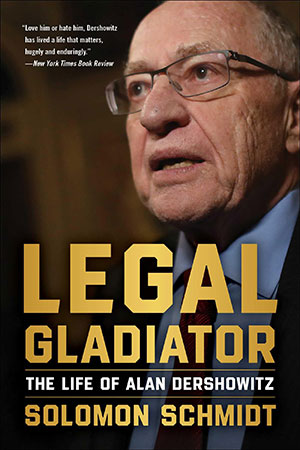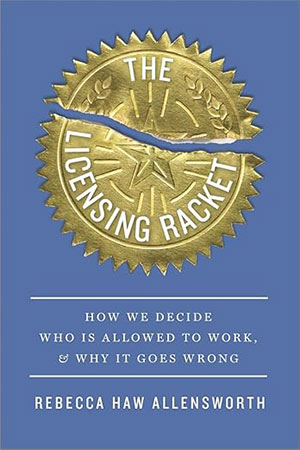 Verdict: It’s a Keeper
Verdict: It’s a Keeper
Legal Gladiator: The Life of Alan Dershowitz
By Solomon Schmidt (New York, NY: Skyhorse Publishing, 2024). 449 pgs. $29.15. Order, amazon.com.
Reviewed by Irwin Kass
The saying goes, sometimes you either love or hate a person. The same can be said of a book about a person. I loved this book about the life of attorney Alan Dershowitz. I now love who he is because I learned what he believes in and why he fights for his beliefs, no matter the consequences.
For instance, in a 1995 well-publicized trial, Dershowitz helped successfully defend football player and TV personality OJ Simpson, accused of killing his ex-wife and a male visitor. After Dershowitz publicly expressed his opinion that Simpson likely did it, Dershowitz discovered that police misconduct would make a conviction unconstitutional. He gladly endured the subsequent public and private criticism.
Dershowitz was born in 1938 in Brooklyn, N.Y., to religious Jewish parents. They were part of a large family of Holocaust victims and survivors. As a youngster, he often overheard the survivors relive their horror. He could not reconcile their experiences with the rigid teachings of his rabbis, who punished him for challenging their authority. This attitude toward authority later got him into hot water with judges, too.
His parents led by example as outspoken supporters of the ACLU and the NAACP. They encouraged Dershowitz to not be afraid to challenge anyone who took unfair advantage of someone else. It helped that he had a gift of being able to debate well. He was captain of the high school varsity debate team. He could articulate compelling arguments on either side of any issue. He nurtured his craft in college to set the foundation for his legal career.
Dershowitz started his legal career in 1964 on the Harvard Law School faculty after graduating from Yale Law School and clerking at the District of Columbia Court of Appeals and then the U.S. Supreme Court. His law students gave him the highest rating. In 1967, at age 28, he became the youngest tenured professor in the school’s history. In 2013, he retired from Harvard. During this time as a professor, he was also an author, speaker, lecturer, and legal commentator.
Dershowitz is known for taking controversial cases, despite criticism by Harvard Law School and others. Examples include representing a man pressured to be a government informer after illegal wiretaps; a man charged with obscenity; Nazis planning to march in the neighborhoods of Holocaust survivors; and two men sentenced to death. In this latter case, the U.S. Supreme Court vacated the sentences but expanded the death penalty. To the criticism of fellow death penalty opponents for taking this risk, he replied that his only concern was for his clients in this case, whom he saved on resentencing.
Beginning in 1985, Dershowitz was more in demand after winning a new trial for Claus von Bulow, who had been convicted of murdering his wife but found not guilty on retrial based on newly disclosed evidence. Later clients included realtor Leona Helmsley for tax evasion, evangelists Jim and Tammy Faye Baker for fraud, and boxer Mike Tyson for sexual assault. Many years later, Dershowitz also became a client, successfully defending himself against sordid accusations over his representation of and association with financier Jeffrey Epstein.
Dershowitz has advised U.S. presidents on the Middle East, to much criticism because he is a vocal supporter of Israel. He also helped President Clinton and President Trump on their impeachment cases, which cost him dearly in lost friendships. He has also worked tirelessly for many decades to free Jewish Russian political prisoners, despite many obstacles.
Dershowitz liked to tape hate mail on his office door to share with his students who often helped him in his cases. To him, these letters proved that he and they were doing well as advocates for people needing representation. He liked to remind critics that he worked as tirelessly for pro bono clients as he did for those who could afford his fee.
Dershowitz has taught us that you must be willing to stand alone, if you believe you are right.
Irwin Kass, Chicago Kent College of Law 1976, is retired.
 Verdict: It’s a Keeper
Verdict: It’s a Keeper
The Licensing Racket: How We Decide Who Is Allowed to Work, & Why It Goes Wrong
By Rebecca Haw Allensworth (Cambridge, MA: Harvard Univ. Press, 2025). 289 pgs. $35. Order, amazon.com.
Reviewed by Katherine D. Spitz
The Licensing Racket provides readers with an informative overview of the state of professional licensing today. Rather than taking the simplistic tack that licensing is inherently good or bad for society and professionals, the author illustrates through detailed examples how the status quo, though well intentioned, often fails to live up to its aims. On the one hand, Allensworth argues that the proliferation of licensing and education requirements for certain occupations, such as barbering or auctioneering, can bar members of economically disadvantaged groups from earning a more lucrative living. At the same time, she concludes that many licensing boards, particularly medical licensing boards, frequently fail to live up to their mission of protecting the public.
Replete with detailed examples of both shortcomings from across jurisdictions and professions, The Licensing Racket paints a convincing, well-researched picture of the structural deficiencies of a system in which boards composed of professionals are loathe to police their own, to the detriment of the public they serve. It is a fascinating, if at times infuriating, sketch of the unseen impacts of the regulatory status quo. Her discussion of the impact of discipline in the legal and medical professions on rural and low-income litigants and patients (who more frequently encounter the professions’ bad apples) is a sobering, but worthwhile, read.
Allensworth concludes that fewer occupations should require a license, thus lowering artificial barriers to entry, but that the licensing boards for professions like law and medicine need significant reform to be effective. Some of her ideas for reform, including inviting stakeholders from outside the professions to serve on licensing boards to foster independence and mandating greater public transparency, make good practical sense. However, her primary solution to the problem – a significant increase in public funding to hire more staff to investigate and prosecute complaints for those licensing boards that remain and the adoption of the United Kingdom’s model for professional discipline – is not feasible. Assuming for argument’s sake that more funding would fix the issues Allensworth identifies, she notes that funding increases have been proposed and rejected many times across states and provides little argument concerning why any state government would change course.
The Licensing Racket provides readers with an accessible, thought-provoking glance at the state-level licensing environment and its pitfalls. The author draws on both scholarship and stories from attendance at numerous board hearings to draw the reader in. While the book may fall a little short in providing solutions to the problems it describes, the book is a valuable starting point for anyone interested in regulatory issues and their reform.
Katherine D. Spitz, Notre Dame 2007, operates Spitz Mediation Services LLC, Pewaukee.
Want to Review a Book?
Please request a book and writing guidelines from the Wisconsin Lawyer managing editor at wislawmag@wisbar.org. Reviewers may keep the book reviewed. Reviews of about 500 words are due within 45 days of receiving the book. Reviews are published, space permitting, in the order received and may be edited for length and clarity.
» Cite this article: 98 Wis. Law. 66-67 (June 2025).
